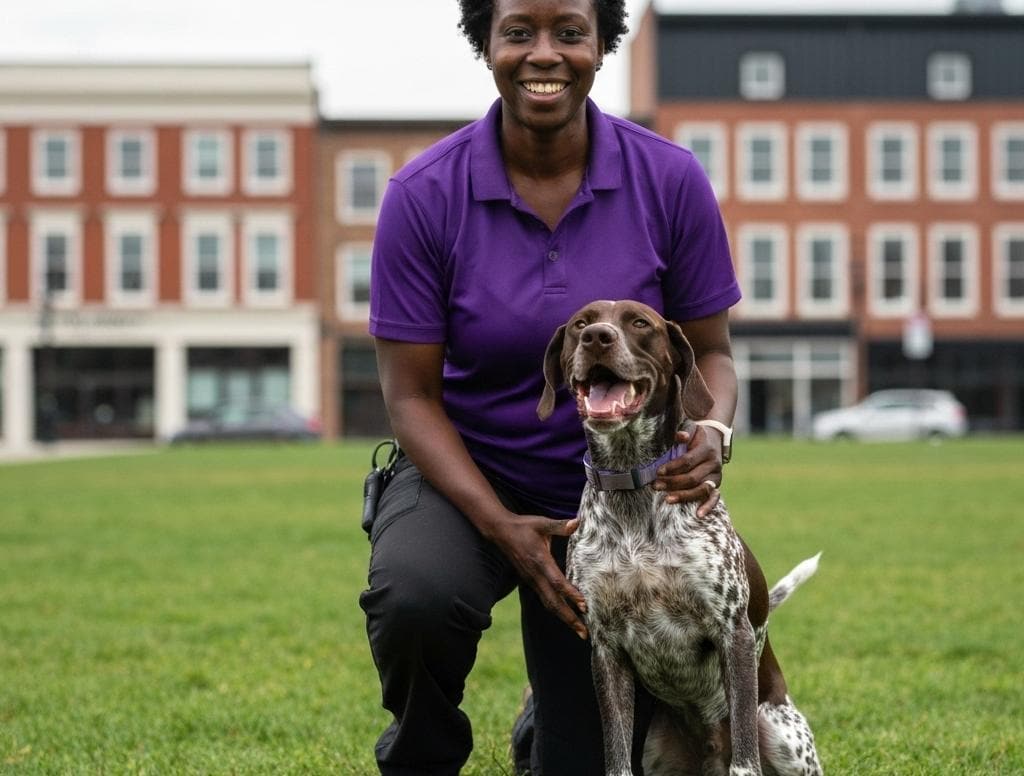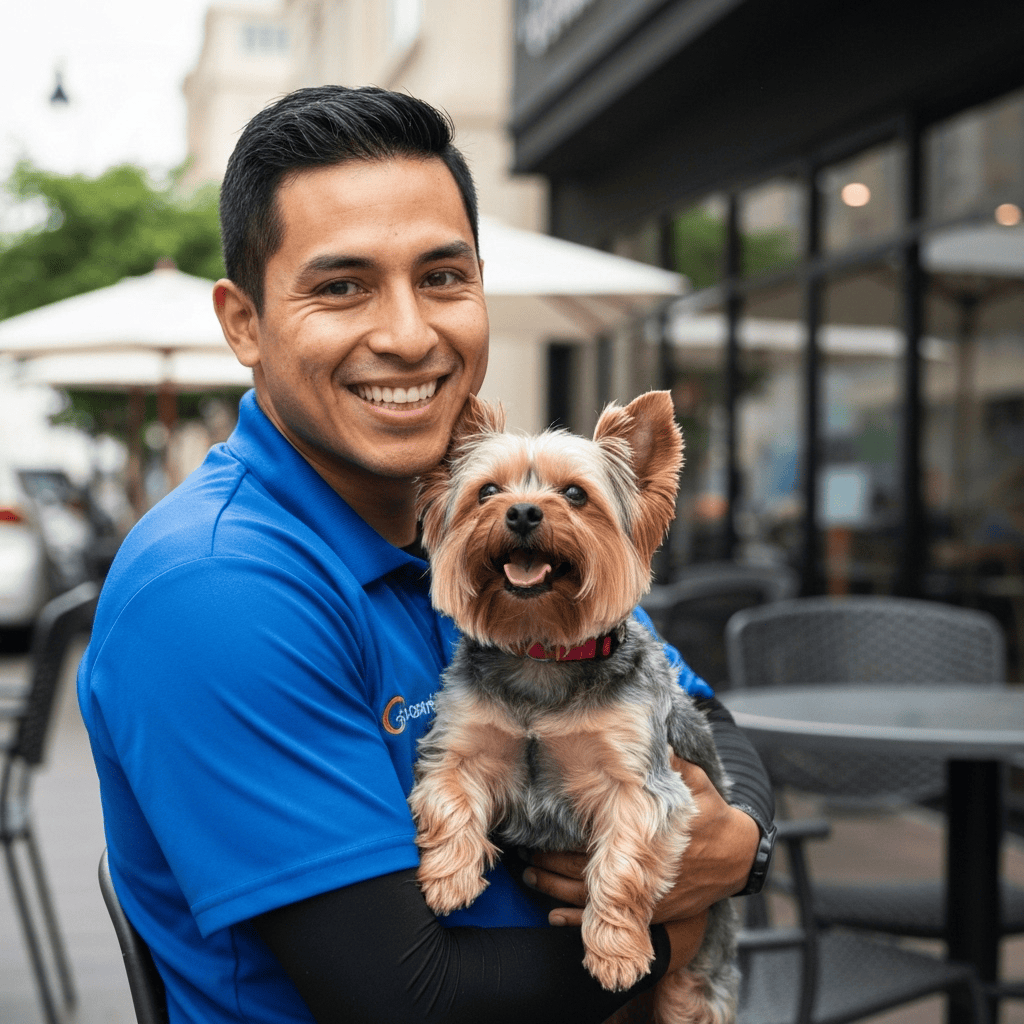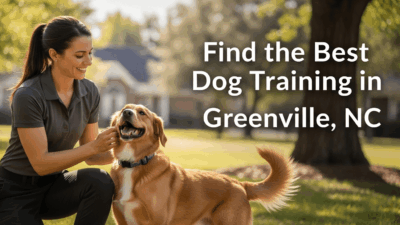Your Complete Guide to Choosing a Dog Trainer in Greenville
Finding the right dog trainer in Greenville means looking for someone who understands life here. Your dog needs to handle the crowds near ECU campus, walk calmly through the busy Town Common, and maybe even enjoy the farmers market on weekends.
Most families come to training with similar concerns. Maybe your puppy is still having accidents in the house, or your rescue dog pulls so hard on walks that you avoid the beautiful South Tar River Greenway. Some dogs bark at every jogger or get overly excited when visitors come to the door.
The good news is that Greenville has plenty of great spaces to practice training once you find the right help. From quiet neighborhood streets to busier areas like Evans Street, there are opportunities everywhere to build your dog’s confidence and skills.
Understanding Local Rules and Requirements
Before you start looking for a trainer, it helps to know what’s expected of dog owners in our area. Pitt County doesn’t require dog trainers to have special licenses, but that doesn’t mean anything goes.
Within Greenville city limits, dogs must stay on leash in public spaces. You’ll need to clean up after your dog, and excessive barking can lead to nuisance complaints from neighbors. These aren’t just rules to follow – they’re skills your trainer should help you work on.
For questions about animal control or city regulations, Greenville’s Animal Protective Services handles enforcement: Greenville Animal Protective Services. If you live outside the city or need county-wide services like shelter support, Pitt County Animal Services is your main resource.
Your dog needs current rabies vaccination and should wear the rabies tag on their collar. There’s no separate county dog license right now, but that rabies tag is required throughout North Carolina.
What Makes a Good Trainer

The best trainers in Greenville focus on positive reinforcement – rewarding the behaviors you want instead of punishing what you don’t like. This approach builds your dog’s confidence and works especially well in our busy college town environment.
Look for someone who plans to work in real places, not just a training room. A good trainer will start with basics in a quiet space, then gradually work up to practicing around the distractions your dog actually encounters. That might mean working near the campus areas where college students walk by, or practicing calm greetings at pet-friendly stores.
Many professional trainers earn certifications to show they understand dog behavior and humane training methods. You might see credentials like CPDT-KA, KPA-CTP, or IAABC-CDBC. While certifications aren’t required by law, they show a trainer has invested in learning proper techniques and follows ethical guidelines.
Training Methods That Work
Different situations call for different approaches, but they should all be based on kindness and patience. Positive reinforcement means your dog gets something good when they make the right choice – maybe treats, praise, or a chance to sniff that interesting spot on the walk.
For dogs who get scared or reactive around triggers like other dogs or bicycles, trainers often use techniques called desensitization and counterconditioning. This means gradually exposing your dog to whatever bothers them, but at a distance where they can stay calm and learn new associations.
Management is another important piece. This means setting up your environment so your dog can’t practice unwanted behaviors. Baby gates, puzzle toys, and proper exercise all help prevent problems before they start.
Stay away from trainers who rely on intimidation, shock collars, or “dominance” theories. These methods can make problems worse and damage the trust between you and your dog.
What Training Costs in Greenville
Prices vary depending on what type of help you need and the trainer’s experience level. Here’s what most families in the Greenville area can expect to pay in 2025:
| Service Type | Typical Price Range |
|---|---|
| Group classes (4–6 weeks) | $130 – $240 |
| Puppy classes (4–6 weeks) | $130 – $240 |
| Private lessons (60 minutes) | $85 – $140 per session |
| In-home dog training (60–90 minutes) | $100 – $160 per visit |
| Day training (trainer works dog + handoff) | $350 – $700 per week |
| Board and train (2–3 weeks) | $1,600 – $3,000 total |
| Behavior modification consult (reactivity, fear) | $120 – $200 for initial session |
Many trainers offer package deals that bring down the per-session cost. Dogs with serious behavioral issues like aggression or severe anxiety typically cost more because they require specialized knowledge and extra safety precautions.
Questions to Ask Before You Choose
A good trainer will welcome your questions and take time to explain their approach. Here are the most important things to ask:
- What training methods do you use, and how do you keep dogs comfortable and motivated?
- Do you have professional certifications, and how do you stay current with training techniques?
- Where will we practice, and how will you help my dog succeed in busy Greenville locations?
- What does a typical training plan look like over the first month or two?
- How will you track progress and decide when we’re ready for more challenging situations?
- What’s included in your pricing, and are there extra fees for travel or materials?
- Do you carry liability insurance?
- For serious behavioral problems, how do you work with veterinarians?
- What will I need to practice at home between sessions?
Great Places to Practice Around Greenville
Once you start training, you’ll want safe places to practice new skills. The Town Common is perfect for working on attention and impulse control around moderate distractions. River Park North offers nature trails where you can practice loose leash walking in a calmer setting.
The South Tar River Greenway gives you longer stretches to work on sustained good behavior, while neighborhood parks like Elm Street Park work well for shorter, focused training sessions.
When your dog is ready for more challenges, downtown areas and pet-friendly businesses provide real-world practice opportunities. Just remember that dogs must stay leashed in public spaces, and always clean up after your pet.
For longer adventures, Goose Creek State Park welcomes leashed dogs on most trails. You can find their pet policies and more information about other state parks at Pets in NC State Parks and Goose Creek State Park.
Making Your Decision
The right trainer for your family will understand both dog behavior and what life is like in Greenville. They should use methods based on positive reinforcement, have a clear plan for helping you reach your goals, and practice in the types of places where you actually spend time with your dog.
Don’t be afraid to ask questions or request references from other local families. A professional trainer will be happy to discuss their approach and help you understand what to expect.
With consistent practice and good guidance, you’ll have a well-behaved companion ready to enjoy everything Greenville has to offer. Whether that’s walking the greenways, visiting outdoor events, or just being a calm, polite member of your household, the right training makes all the difference.

Common Questions About Dog Training in Greenville
How much does in-home dog training cost?
Most families in Greenville pay between $100 and $160 per session for in-home training. The exact price depends on your location, how long sessions last, and what specific issues you’re working on.
Is in-home dog training worth the extra cost?
In-home training can be really valuable because it addresses problems in the exact environment where they happen. If your dog jumps on visitors at your front door or has trouble settling in your living room, working at home makes the most sense.
Can a trainer help with house training my dog?
Yes, many trainers specialize in house training, especially for puppies or newly adopted dogs. But remember that house training success depends a lot on consistency from everyone in your household between training sessions.
What is the 3-3-3 rule for dog training?
This rule suggests that new dogs need about 3 days to start feeling safe, 3 weeks to begin learning your routines, and 3 months to really settle into your family. It’s a helpful reminder to be patient and celebrate small improvements along the way.
How long will it take to see results from training?
For basic skills like sitting, staying, or walking on a loose leash, most dogs show noticeable improvement within 3 to 6 weeks if you practice daily. More complex issues like fearfulness or reactivity toward other dogs typically take several months of consistent work.
What should I bring to my first group class?
Bring a regular collar or harness, a standard 6-foot leash, small training treats, waste bags, and water for your dog. Leave retractable leashes at home since they can be unsafe in group settings.
What are the leash laws in Greenville?
Dogs must be properly restrained when in public areas within city limits, and owners must clean up waste. For specific questions about enforcement, contact Greenville Animal Protective Services.
Do I need to license my dog in Pitt County?
Pitt County doesn’t currently require a separate dog license. However, your dog must have current rabies vaccination and wear the rabies tag on their collar, as required throughout North Carolina.
What vaccinations does my dog need?
Rabies vaccination is required by state law. Your veterinarian can advise you about other vaccines based on your dog’s lifestyle and risk factors. For general rabies information, see NC DHHS Rabies.
Do dog trainers need licenses in North Carolina?
No, the state doesn’t license dog trainers. However, many professional trainers earn voluntary certifications like CPDT-KA or KPA-CTP to demonstrate their knowledge and commitment to humane methods.
Where can I practice off-leash training safely?
Only use securely fenced areas or designated off-leash zones for off-leash work. Most Greenville parks require dogs to stay leashed, so you’ll need to build recall skills using a long training line first, then transition to a safe enclosed space.
Can I do training work at local dog parks?
Light training like practicing recalls or calm greetings is usually fine at off-leash areas, but avoid intensive training sessions that might disrupt other dogs’ play time. Keep treats controlled so you don’t accidentally create conflicts between dogs.
Are there good trails nearby for training walks?
The South Tar River Greenway is perfect for leashed training walks. Goose Creek State Park also welcomes leashed dogs on most trails and provides a different environment for practicing good behavior around wildlife and new smells.
When should I start puppy classes?
Most puppies can start classes around 10-12 weeks old, once they’ve begun their vaccination series and your veterinarian gives clearance for safe socialization. Starting early helps prevent many common behavior problems from developing.
Do trainers offer free consultations?
Many trainers provide free phone consultations to discuss your goals and explain their approach. This is a great opportunity to ask about their methods, pricing, and experience with dogs similar to yours before making a commitment.
